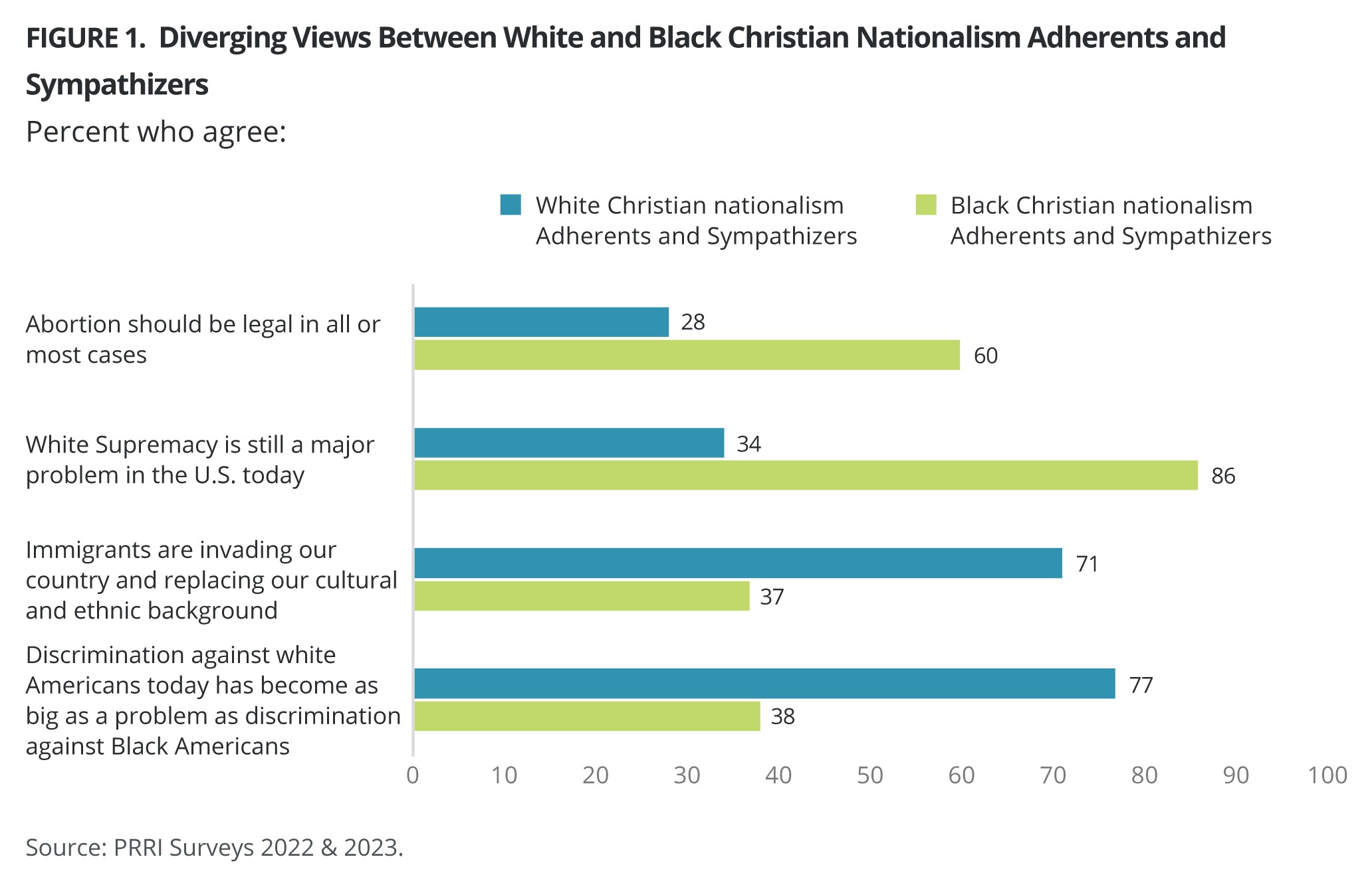Dr. Michael R. Fisher Jr. is an Assistant Professor in the Department of African American and African Studies at Ohio State University and a 2023-2024 PRRI Public Fellow.
Survey data from PRRI’s 2023 American Values Atlas on support for Christian nationalism reveals that, while residents of red states are more likely to resonate with Christian nationalism than those in blue states, three in ten Americans nationally qualify as Christian nationalism supporters (this includes 10% who qualify as Christian nationalism Adherents and 20% who qualify as Christian nationalism Sympathizers). Although Christian nationalist sentiment resonates across the United States, it’s important to recognize that, like many demographic groups, supporters of Christian nationalism don’t universally subscribe to the same ideas.
This Spotlight Analysis considers different worldviews between Black and white Christian nationalism Adherents and Sympathizers and underscores their divergent views on five topics: 1) abortion, 2) immigration, 3) white supremacy, 4) racial discrimination against white Americans, and 5) support for Joe Biden and Donald Trump. Some pundits have made sweeping generalizations about the political and social agenda of Christian nationalists. Upon closer look, however, available data show that Black and white Christian nationalism Adherents and Sympathizers disagree on several issues. These disagreements reveal different worldviews and raise caution against overgeneralizing descriptions of Christian nationalism supporters.
Views on Abortion and Immigration
Abortion will likely be a key issue in the 2024 election given the Supreme Court’s ruling that struck down Roe v. Wade in June 2022. Additionally, PRRI survey data show that abortion has become an increasingly salient issue for Americans in recent years.
On this issue, most Black Americans who qualify as Christian nationalism Adherents and Sympathizers say abortion should be legal in most or all cases (59%). By contrast, most white Christian nationalism Adherents and Sympathizers say abortion should be illegal in most or all cases (70%).
Immigration, like abortion, remains a vehemently debated topic in the U.S. The policies of the Trump and Biden administrations reflect contrasting ideologies. During his 2020 campaign, President Joe Biden promised to reverse many of the Trump administration’s harshest immigration policies and has done so during his term as president. PRRI’s 2023 American Values Survey reveals that most Americans don’t believe that immigrants pose a threat to the U.S. (57%). Here, the threat in question refers to the perception that immigrants “are invading our country and replacing our cultural and ethnic background,” an idea referred to as the “Great Replacement Theory.”
Most Black Christian nationalism Adherents and Sympathizers(61%) completely or mostly disagree with the statement “Immigrants are invading our country and replacing our cultural and ethnic background.” Inversely, nearly three-quarters of white Americans who qualify as Christian nationalism Adherents and Sympathizers agree with the statement (71%).
Views on White Supremacy and Discrimination Against White Americans
In 2023, in collaboration with E Pluribus Unum (EPU), PRRI analyzed focus groups held with residents of thirteen southern states about the legacy of Confederate monuments, which many argue are reminders of white supremacy in the South. The murder of George Floyd by a white police officer in Minneapolis in 2020 sparked national protests and difficult but necessary conversations about white supremacy, including the presence of Confederate monuments.
While some argue that the country has not effectively reckoned with the legacy of white supremacy and its ongoing impact on people of color in the U.S., other Americans maintain that it is no longer a pressing problem. As with immigration and abortion, there’s a stark contrast between how Black and white Christian nationalism supporters view this topic. Most Black Americans who qualify as Christian nationalism Adherents and Sympathizers overwhelmingly agree that white supremacy is still a major problem in the U.S. today (86%). Conversely, most white Christian nationalism Adherents and Sympathizers (64%) completely or mostly disagree that white supremacy is still a major problem.
As their views on white supremacy indicate, Black and white Christian nationalism Adherents and Sympathizers disagree on whether discrimination against white Americans is a major problem in the U.S. On the one hand, most Black Christian nationalism Adherents and Sympathizers (61%) completely or mostly disagree with the statement that “discrimination against white Americans today has become as big a problem as discrimination against Black Americans and other minorities.”On the other hand, most white Christian nationalism Adherents and Sympathizers agree that racial discrimination against white Americans is as big a problem in the U.S. as that faced by minorities (77%).

Views on President Joe Biden and former President Donald Trump
As we look toward the 2024 presidential election where issues like abortion and immigration are likely to be at the forefront of public discourse, the campaigns of President Joe Biden and former President Donald Trump reflect divergent paths forward in the U.S. and are supported by different constituencies. The difference between those constituencies, in part, reflects racial divisions even among supporters of Christian nationalism.
Nearly two-thirds (62%) of Black Christian nationalism Adherents and Sympathizers hold favorable views of Biden compared with only 11% of white Christian nationalism Adherents and Sympathizers. In comparison, less than one-quarter (21%) of Black Christian nationalism Adherents and Sympathizers view Trump favorably compared with around seven in ten white Christian nationalism Adherents and Sympathizers (71%).
Different Worldviews
The disagreement between Black and white supporters of Christian nationalism on key issues reveals different worldviews between the two groups. Examining partisan affiliations among Black Americans partially explains this. Black Americans are a historically strong voting bloc within the Democratic party. Insofar as views on issues like abortion and immigration reflect partisan divides and Democrats tend to lean left of center while Republicans — who are predominantly white — lean the opposite, it’s unsurprising that Black and white supporters of Christian nationalism hold divergent views on these issues. But party affiliation alone doesn’t fully account for the divergence.
Understanding the role of Christianity in Black communities is also useful in considering the differences between these groups. As historians like Albert J. Raboteau and Curtis J. Evans argue, Black communities historically used Christianity to interpret and motivate responses to racial oppression and injustice in the U.S.Indeed, for many Black Americans across time, their lived experiences significantly shaped their theology and political views. History bears witness to the fact that many Black and white American Christians’ lived experiences have been radically different, leading to different worldviews between the two groups as evidenced in PRRI’s Christian Nationalism survey.
Thus, it’s important not to overgeneralize our descriptions of those who qualify as supporters of Christian nationalism. Research suggests that the term “Christian nationalist” doesn’t capture the ideological and political differences between Black and white Americans who qualify as Christian nationalism Adherents and Sympathizers. We must acknowledge these distinctions in discussions of Christian nationalism and conduct more research about the differences between these two groups. As with many other issues, one size doesn’t fit all.





